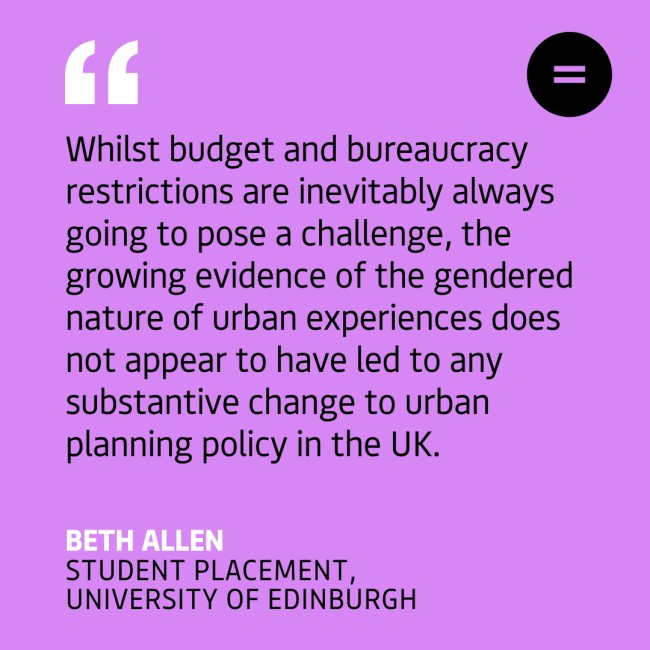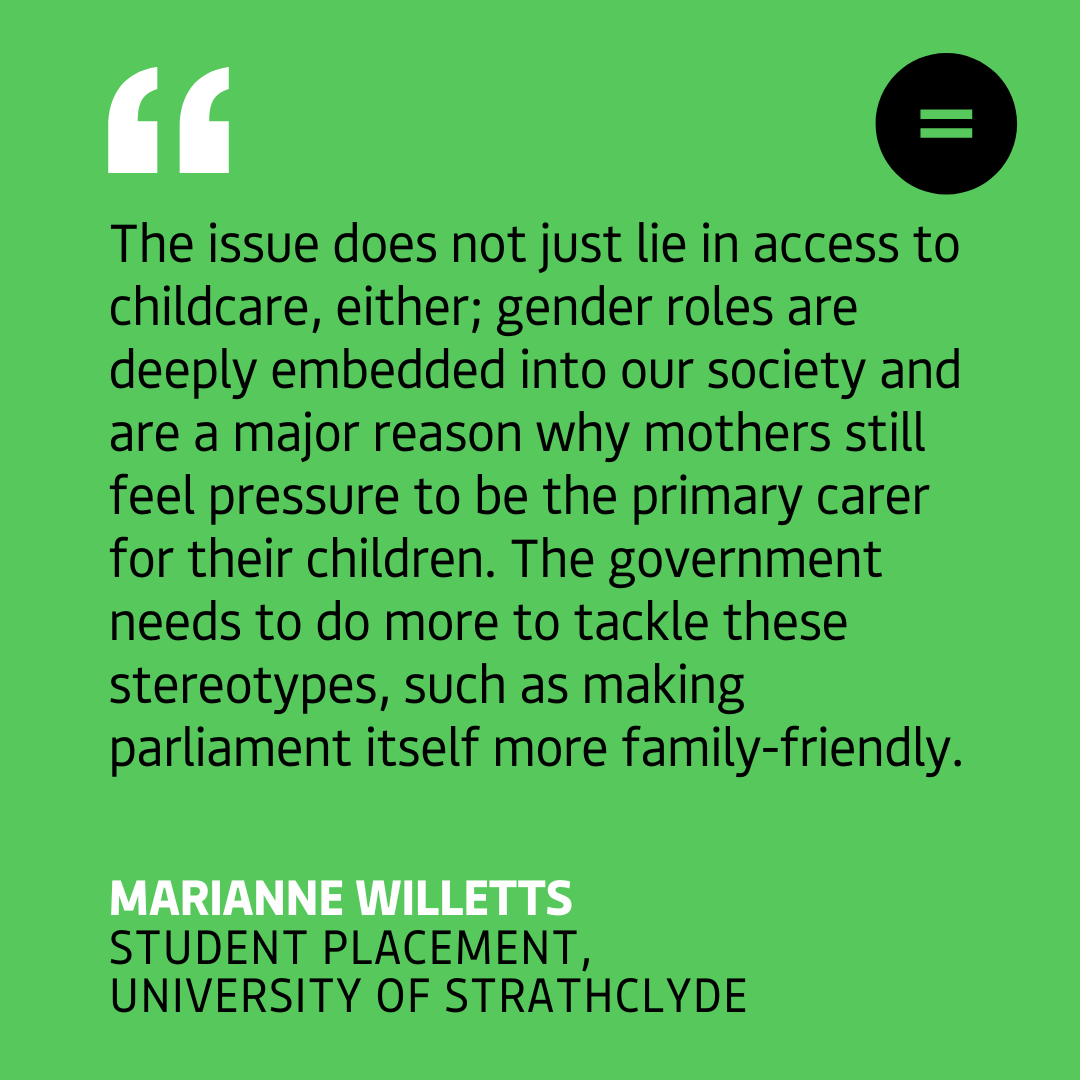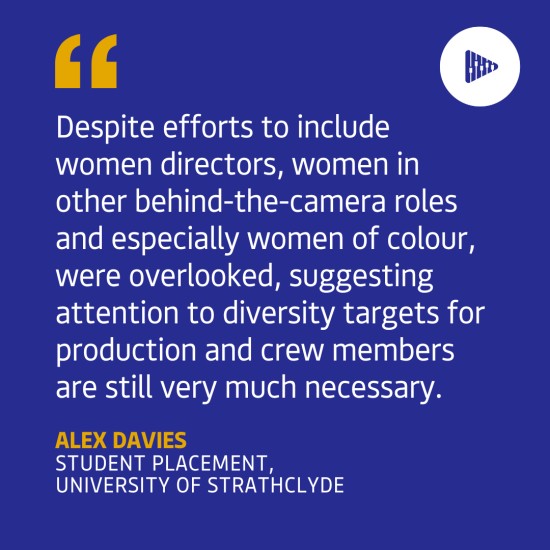Engender blog
GUEST POST: Critically minded? The problem of diversity in film criticism
Engender and the Equal Media and Culture Centre for Scotland have hosted student placements from the MSc in Social Research at the University of Edinburgh and the University of Strathclyde Applied Gender Studies and Research Methods course. As part of their research outputs, the students have produced a series of blogs.
In this post, Alex highlights the need for an intersectional approach to examining our cultural data and why we need more diverse voices in film criticism.

Film criticism fulfils multiple purposes. People read film reviews for suggestions on what to watch, and whether it’s worth shelling out to go to the cinema.
As a result, film reviews are also tied to a film’s financial success, its consideration for awards and whether it gets a wide release at all. Thus, critics can become “gatekeepers,” defining what counts as “good” art.
GUEST POST: Feminist urbanism: Creating gender-equal cities in Scotland
Engender and the Equal Media and Culture Centre for Scotland have hosted student placements from the MSc in Social Research at the University of Edinburgh and the University of Strathclyde Applied Gender Studies and Research Methods course. As part of their research outputs, the students have produced a series of blogs.
In this post, Beth looks at how women and men experience public space and urban environments and how we can create gender-equal cities in Scotland.

When considering issues of gender inequality, one aspect that is perhaps far subtler and more discrete than others is the way in which the built environment is experienced differently by men and women.
In recent decades, feminist research has studied this phenomenon, with the evidence undeniably pointing to women being disadvantaged in their use of urban spaces. From a lack of accessible and functional public toilets, which biologically women require greater use of, to transport systems that are not built for a purpose beyond that of a daily office commuter, a range of factors have been demonstrated to restrict women’s access to the cities.
GUEST POST: Digital abuse against feminist scholars: a case study
Engender and the Equal Media and Culture Centre for Scotland have hosted student placements from the MSc in Social Research at the University of Edinburgh and the University of Strathclyde Applied Gender Studies and Research Methods course. As part of their research outputs, the students have produced a series of blogs.
In this post, Yoke explores a case study of the online backlash and digital abuse experienced by feminist researchers and scholars.
![The graphic shows a light blue background with white left-aligned text quote that reads "Research has shown that when women speak publicly about ‘controversial’ topics, such as feminism, this triggers online abuse. [...] These attacks must be recognised as part of a historical pattern of violent repercussions against those who defy patriarchal, white supremacist, capitalist dominance.". The quote is attributed to Yoke Baeyens, Student Placement, University of Strathclyde. In the top right-hand corner of the graphic there is the Equal Media and Culture Centre logo.](/siteimages/Blog/yoke-blog-2.png)
Online abuse is used as a silencing mechanism against women and other minoritised identities in the public (online) space.
Weaponising misogyny and dehumanisation techniques, perpetrators aim to push their targets outside the public sphere, to reinstate misogynistic, heteronormative dominance. These public displays of violence also serve to remind and threaten others who might want to defy misogynist, white supremacist, and heteronormative power structures. As Gosse et al. (2021) state, online abuse causes scholars and journalists to self-censor and choose ‘safe’ topics to discuss publicly in an attempt to protect themselves, thereby upholding the status quo. Indeed, research has shown that when women speak publicly about ‘controversial’ topics, such as feminism, this triggers online abuse. This is particularly a problem for feminist scholars who use social media to spread information on feminist research. These attacks must be recognised as part of a historical pattern of violent repercussions against those who defy patriarchal, white supremacist, capitalist dominance. Women have always been the target of abuse, and while the medium is new and everchanging, the intention is not.
GUEST POST: The Cost of Childcare Crisis
Engender has recently hosted student placements from the MSc in Social Research at the University of Edinburgh and the University of Strathclyde Applied Gender Studies and Research Methods course. As part of their research outputs, the students have produced a series of blogs.
In this post, Marianne looks at how the cost of living crisis continues to disproportionately impact women, and how this is compounded by women's unpaid work and childcare responsibilities.

Milk, bread, electricity, petrol and even crème eggs: the cost of living crisis has seen drastic surges in prices of just about every household good. Everyone’s purses are feeling the strain, and heads are turning to the government to aid the struggling population.
Often unacknowledged in these debates, however, is the evidence that women are being disproportionately affected by the cost of living crisis over men. The economic instability of the country is affecting the lowest-paid of the population, of which women make up the majority, with 69% of low-paid and insecure jobs being held by women. Engender released their Women & The Cost of Living report in November 2022 that highlighted that this disproportion is related to the long-standing inequalities that ensure women make up the highest percentage of low-paid jobs, such as those in the care sector and unpaid care and domestic jobs at home. Based on this perhaps unsurprising revelation, Engender made a series of suggestions for the Scottish Parliament in order to tackle these inequalities.
GUEST POST: Do we need diversity quotas in film?
Engender and the Equal Media and Culture Centre for Scotland have hosted student placements from the MSc in Social Research at the University of Edinburgh and the University of Strathclyde Applied Gender Studies and Research Methods course. As part of their research outputs, the students have produced a series of blogs.
In this post, Alex looks at why there's still work to do to ensure diversity behind the camera in Scotland's film industry.

The Glasgow Film Festival (GFF) is the UK’s third-largest film festival and one of Scotland’s biggest annual cultural events.
The UK Government has recognised its “significant contribution” to Scottish culture and to the careers of new filmmakers through its Audience Award. The festival’s organisers pick the nominees, but the winner is democratically elected by film-goers. Since the nominees are specifically chosen to nurture the careers of first or second-time directors, the award is a great site to foster a more diverse film industry in Scotland.
In recent years, criticism of the Oscars and BAFTA nominations drew attention to the underrepresentation of women and people of colour in the film sector. Research has demonstrated stark gender and racial disparities behind the scenes of the UK’s film industry. The Calling the Shots project studied British films produced between 2003 and 2015, finding that only 13% of their directors, 20% of their screenwriters and 27% of their producers were women. Statistics for women of colour were even worse, as 90% of the films examined did not employ any women of colour at all.
The Glasgow Film Festival’s director, Allison Gardner, has overseen GFF to go from strength to strength in terms of inclusivity, especially in its recognition of women filmmakers. In 2020, films directed by women opened and closed the festival for the first time and in 2022, 40% of all the films at GFF 2022 were directed by women.
Cinema for All?
Gardner has publicly voiced support for greater inclusivity in film, and has acknowledged that “We need to change those structures,”. Yet she has also asserted that the festival’s inclusive programming is not the result of quotas or targets but of a desire to maintain the “broadest possible appeal” to audiences. In fact, the Audience Award has consistently featured as many (if not more) women directors as men in almost every year of its history (see below), even before developments like 2017’s “Me Too” movement drew attention to gender inequality in the industry.
Downloads
 Engender Briefing: Pension Credit Entitlement Changes
From 15 May 2019, new changes will be introduced which will require couples where one partner has reached state pension age and one has not (‘mixed age couples’) to claim universal credit (UC) instead of Pension Credit.
Engender Briefing: Pension Credit Entitlement Changes
From 15 May 2019, new changes will be introduced which will require couples where one partner has reached state pension age and one has not (‘mixed age couples’) to claim universal credit (UC) instead of Pension Credit.
 Engender Parliamentary Briefing: Condemnation of Misogyny, Racism, Harassment and Sexism
Engender welcomes this Scottish Parliament Debate on Condemnation of Misogyny, Racism, Harassment and Sexism and the opportunity to raise awareness of the ways in which women in Scotland’s inequality contributes to gender-based violence.
Engender Parliamentary Briefing: Condemnation of Misogyny, Racism, Harassment and Sexism
Engender welcomes this Scottish Parliament Debate on Condemnation of Misogyny, Racism, Harassment and Sexism and the opportunity to raise awareness of the ways in which women in Scotland’s inequality contributes to gender-based violence.
 Gender Matters in Social Security: Individual Payments of Universal Credit
A paper calling on the Scottish Government to automatically split payments of Universal Credit between couples, once this power is devolved to the Scottish Parliament.
Gender Matters in Social Security: Individual Payments of Universal Credit
A paper calling on the Scottish Government to automatically split payments of Universal Credit between couples, once this power is devolved to the Scottish Parliament.
 Gender Matters Manifesto: Twenty for 2016
This manifesto sets out measures that, with political will, can be taken over the next parliamentary term in pursuit of these goals.
Gender Matters Manifesto: Twenty for 2016
This manifesto sets out measures that, with political will, can be taken over the next parliamentary term in pursuit of these goals.
 Scottish NGO Briefing for UN Special Rapporteur on Violence Against Women
Joint briefing paper for the UN Rapporteur on Violence Against Women.
Scottish NGO Briefing for UN Special Rapporteur on Violence Against Women
Joint briefing paper for the UN Rapporteur on Violence Against Women.

Newsletter
Sign up to receive our newsletter here:
Sign up to our mailing list
Receive key feminist updates direct to your inbox: